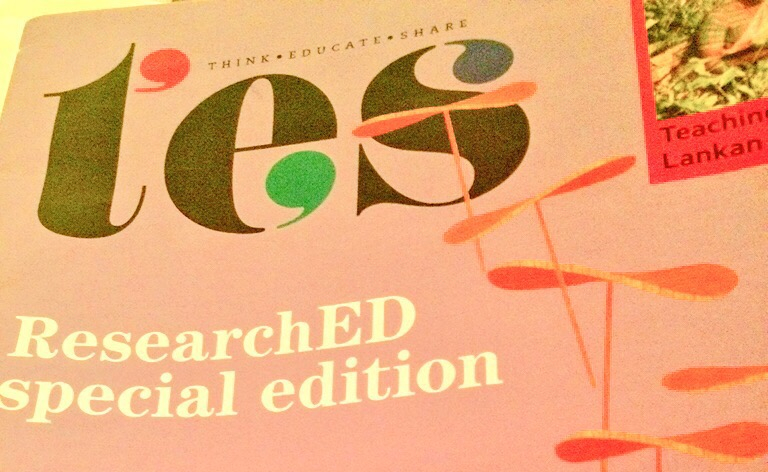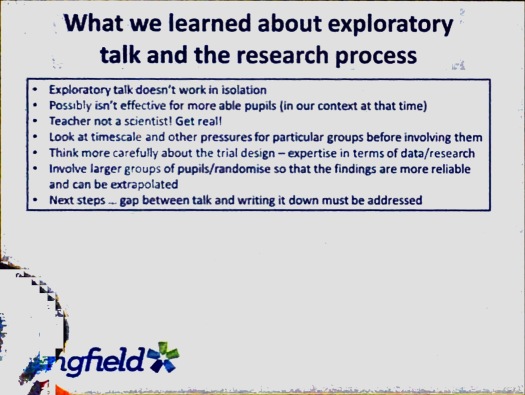Bit of a bold statement I know and I am rather behind the times but I have a feeling that in the long-term the title of this blog may well have some value.
ResearchEd2015 was better than I could have hoped. Due to exhaustion of the first week back and choosing life over teaching, I didn’t make it to the ResearchEd National Conference 2014. Similarly, I didn’t really know about it in 2013 but I knew something important was happening and was intrigued to know what. This year I was determined to go.
A few years ago John Tomsett wrote about why younger teachers (when I was considered young!) should get involved in the research ‘movement’ (as Tom Bennett hates to call it!). At the time, I was intrigued but mildly intimidated by the term research and like many didn’t understand how it could apply to me. I am thankful that John planted this seed in my mind but it both terrified and worried me because I didn’t know where to start or how to avoid the downfall suggested in John’s blog if I didn’t become ‘research-savvy’.

Since then, I have been quietly reading some of the texts suggested by Research Gurus such as Tom Bennett, Alex Quigley, Daisy Christodoulou and many others. I don’t have the time to read research as much as I would like but I am a fan of the simplicity of the EEF website because it allows me to scan for further ideas without too much hardship. So far, this has been the extent and impact of research on my teaching. I teach 25 lessons a week and have a lot more going on. Time is valuable and also my excuse for not engaging with research further.
I was therefore honoured (and surprised) to be mentioned by John again yesterday as one of many who were influenced by his blog on a revision method using Metacognition. From the moment I read John’s blog on Metacognition and revision I knew it was key not to just talk about it and try it but to ask questions, consider effects on student outcomes and follow up use of such techniques. I trailed the technique over a space of a month with my year 11 group. I conversed with John to check on the details (how and what to suggest to the students) and spent time reading the research he had referenced. I wrote up my immediate findings but haven’t yet had a chance to reflect in detail on my results. I felt that, for once, I had really thought about my practice and that it was well informed – I know from my little experience that for many this isn’t always the case. We see far too often implementation of ideas that haven’t been understood or thought out; depressingly a new idea is often suggested for the wrong reasons or merely due to lack of time to become sufficiently informed. I now know that I need to and should be confident enough to explore the effect of the devices I implement with a critical and informed view. My key lessons from ResearchEd15 stem from this point precisely. I will write about what I have learnt and how I’ve used it at a later date when I’ve had time to digest them.
Here are some notes on those I heard from:
Daisy Christodoulou: whose talk was fascinating in terms of explaining why levels don’t and were never supposed to work in the way we used them – to someone who never understood the point of them anyway and has never been forced to use them – this made complete sense. Daisy’s key point was that there are viable alternatives to levels and that the danger is they will be merely “rehashed”. She made a convincing argument that multiple choice questions can be used to assess writing heavy subjects (see below) and an even better argument for the use of comparative judgements. I can’t wait to investigate further.
John Tomsett – always fantastic, inspiring and honest. John has often had the most immediate impact on my practice through his writing. Yesterday was no different in that I am determined to analyse my teaching from last year in detail before the week is out. John RAGed the key elements of his teaching from last year. This is something I can easily do with a bit of thought. John also told us about how observations work at his school; he asks ‘How can I observe you in a way that will best help you improve your teaching?’. Again this is a question we can take back to our schools that will have an immediately positive impact.
Finally, John quoted Dylan Wiliam on the role of teachers and again this is something we can all continue to work with:
Sara Davidson and Louise Mower – It was interesting to hear of a research project ‘gone wrong’. Sara (as Louise was poorly) explained the steps they went through to conduct their own research in school on exploratory talk and how the trials concluded. Sara talked about how to set up a trial, the issues they uncovered and their unexpected results. This was extremely helpful should there ever be a time I wanted to do some research in school. It was also great to learn about the process and not the content for once!
James Murphy: spoke about Direct instruction and precision teaching. These are new areas for me but were hugely interesting. I was also intrigued to learn about the common misconceptions in research and know now to look at Englemann before it’s too late!
Tom Sherrington – Tom was kind enough to speak at TLT previously and so I knew he would be good. He explained the current literacy research available to teachers and how it is complied. The key point being there isn’t enough – challenge anyone? He also pointed out the glaring inconsistencies and issues which were laughable and we did laugh quite often! It was interesting to then attend Alex’s session on how to question research for ourselves and how best to use it. It was also priceless to see Tom work out that the lady he hopes he can ‘trust’ that designed his school’s new literacy scheme was sat in the room. Diane Murphy, designer of the new literacy programme Tom was talking about, sat in front of me and seemed trustworthy to me!
Alex Quigley – It was a delight to hear from Alex at last. I did a bit of work for Alex many years ago and have been intrigued by his research lead role. Alex took us on a journey of funny and practical advice. I promise not to believe the hype in research, to strip it back to the original source and to read beyond the headlines! It’s the first time I’ve felt that my overly cynical nature may be of some use in this job! The questions below were particularly useful.

And my favourite slide that chuckles in the face of correlation studies: 
Sam Freedman – Sam’s session was packed. As you would expect, Sam talked with clarity and authority of the issues facing the profession today. By the end I think everyone felt like they’d been hit in the stomach but as it had happened to everyone there was a collective empathy for one and all and most still mustered a smile! The optimism of the day kept everyone afloat and Sam informed us with an underlying gleam of positivity that there is hope of improvement over time. He made some suggestions as to how things could be improved such as scrapping PGCE tuition fees.
My only hope is that the London-centric decision making Sam mentioned ceases to continue and that school led improvement eventually equates to all schools really improving within their own contexts.
I might be late to the party and I don’t feel like a young teacher anymore (I’m about to start my 4th year qualified) but I think it was the right time for me to get involved and I am more determined than ever to become more informed, to question and learn from my mistakes and experiences. ResearchEd has proved to me that being reflective is more than just filling in forms and having a few tick box discussions. I hope that I can develop my new understanding into something extremely valuable and worthwhile. John Tomsett was right.
Thank you to Helene, Tom Bennett and all involved. As always there were many people I didn’t catch up with but that’s what ReasearchEd16 is for or perhaps I’ll get myself a ticket to one in an exotic location next time!







2 Replies to “Last night ‘ResearchEd’ changed my life”